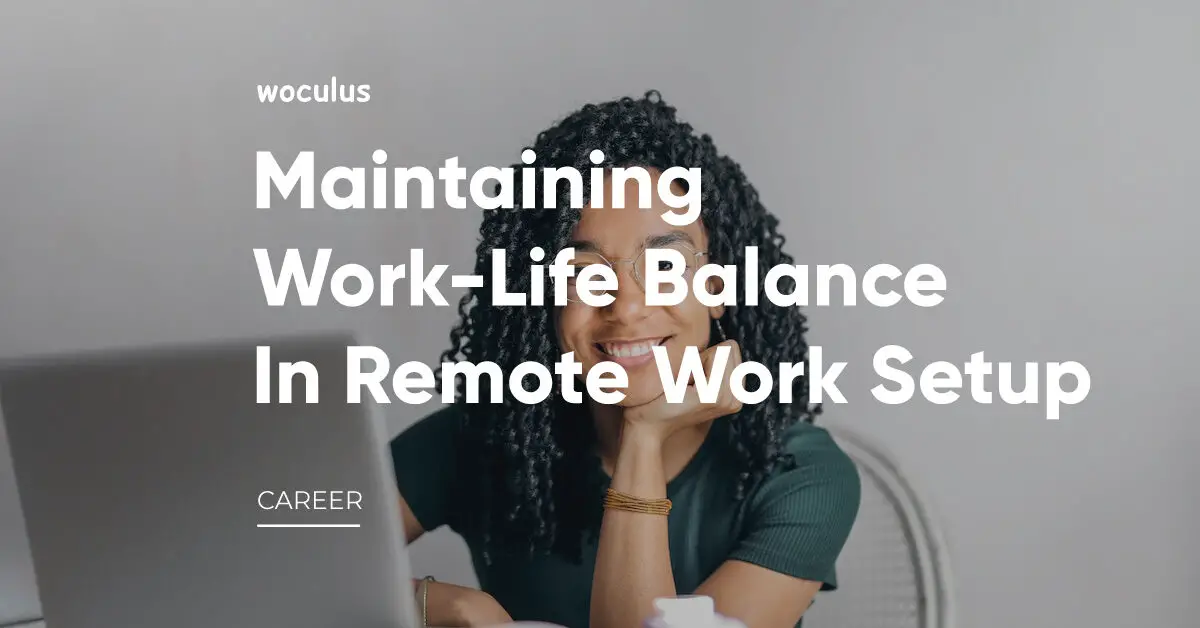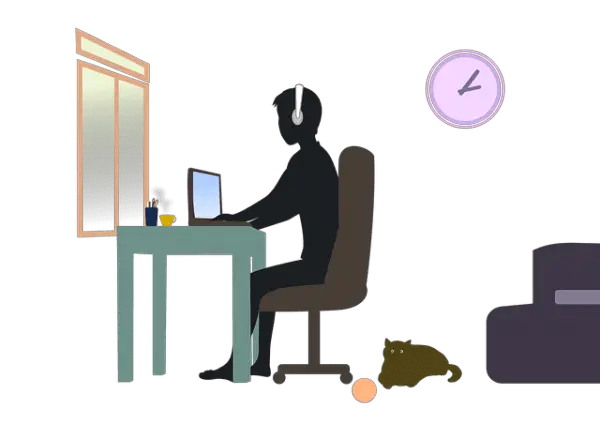Table of Contents
Workers struggle to compartmentalize in a remote work setup and this struggle leads to disharmony in their home lives and their work lives. If you operate in a remote work setup, you need specific skills and considerations to achieve a healthy balance.
Remote Work Setup: Balancing Work and Personal Life Boundaries
As tangible boundaries that help us to separate work territory from the homefront are eliminated by remote work, new skills are needed to balance work and personal life boundaries. Balancing work and personal life boundaries requires excellent planning for both aspects of your life. It is when you plan properly that you know what will go into both aspects and if you are currently able to meet up with their demands.
Create a Dedicated Workspace
The foundation of a healthy work-life balance is discipline. And the good part of this is that discipline in small routine things can yield monumental results. Start with where you work. With remote work, there is this unconscious shift everyone on your team now has that you are not too far from work. With a few steps, you can plug in back to work once you click that button.
However, you can create a dichotomy between your work and general life by separating where you work from the rest of your home. Creating a dedicated space for work sends the signal that when you enter it, you are at work and when you leave it, you have closed for work for the day. Keep the workspace neat and official so that it will carry an ambiance that enhances your productivity.
The alternative is to cozy up at home and work wherever you feel like each day. This method sends a signal that your work is a leisure activity and you may struggle to get the focus and attention to detail needed to turn up good work. The result is that you spend more time on tasks and this leaves less room for other aspects of your life. When setting up your workspace, ensure it has minimal distractions, good lighting, and good aeration. Decorate it to your taste and furnish it with a table and an ergonomic chair. Keep it neat and decluttered at all times.
Top 11 Productivity App For Remote Workers
Create a Practical Routine
Creating a schedule that shows you how much time you need to get your work done and the time you have off work helps you to know when you can be available for friends and family. You can know which of your kid’s games you will attend and when to take your wife on a date night. You can also plan your outing with your girlfriends and when you can invite your sister’s kids for a sleepover.
Creating a routine for work-related activities and another for life activities helps you to spend the right time on the right things. Where you have to make some sacrifices, you can also proactively make your calculations to know sacrifices that are worth taking and those that may cost you more than you are willing to pay. Some remote workers have realized that they need to switch jobs or delay their quest for promotion until a certain period because of the effects it will have on their personal life at present.
Scheduling also enriches your communication. If your children know not to call you during work hours, and your colleagues know not to call you when you are with your family, you can effectively manage both sides without clashes. No one will feel neglected or relegated because of the other. Creating a schedule and sticking creates room for everyone.
Look the Part
Remote work can easily erase the casual culture of professional life if you do not deliberately set out to stay professional. Since you are working from home, you may want to extend the comfort that comes with it to your appearance. But it is dangerous to make it a habit to be casual as it may affect your productive energy. When you dress corporately, the formal appearance sends a signal to your brain that you are about to do something serious.
Once you switch on your PC for work, you will likely hit the ground running as your mental aura has switched to work mode. However, if you remain in your pajamas and haven’t even freshened up, your brain may not kick out of that relaxation mode and you may struggle to generate the mental energy needed for that day’s tasks.
Stay Off on Days Off
People working in physical offices look forward to weekends, vacations, and days off because they feel totally removed from work on those days. Remote workers can struggle with these expectations because their working space and personal space may only be separated by a door or a few feet. But you also need to have that unplugged attitude even if you work remotely. The people you want to spend your days off with need your attention. They want you to focus and fixate on them.
If you struggle to be really there even when you are physically with them, they will notice and it will affect the quality of your personal relationships. The same applies to your working days. When you are working, issues related to your personal life should not be pervasive in your mind. Whatever your indulgences are on your days off, disconnect fully from work and be completely absorbed in them. It will keep your mental health and your productive energy will soar when you resume work.
14 Best Examples of Professional Out of Office Emails – Permanent and Temporary Autoresponses
Nurturing Remote Work-Life Integration
Allowing your working hours to encroach on your personal life does not directly translate into improved productivity. So, those who work all day without respecting boundaries in their personal lives are actually not more productive than those who don’t. In this Forbes article, employees who work long hours are people living with anxiety who do so out of work-related insecurities.
It Begins With the Leaders
If you are a remote team lead, manager, or leader, you need to demonstrate the necessity of a healthy work-life balance to your subordinates. Set a good example that can inspire a healthy remote work culture in your organization. When remote workers struggle to maintain a work-life balance, one of the reasons is because it is a standard practice in that remote work setting.
When leaders work all day every day without demarcating between their personal life and their work, it may seem visionary and powerful in movies, but it is dangerous and unhealthy in real life and should not be presented as the norm. If you are a perfectionist or tend to overwork, you may particularly struggle with work-life balance because you feel guilty whenever you are not working.
However, no matter how long you work, studies have shown that productivity sharply declines after 55 hours of work in a week.
The reason leaders need to take charge in promoting remote work-life integration is that they have the final say in shaping and creating organizational culture and policy. Their attitude and respect for work-life balance will show in these employee guidelines. Remote workers should be able to take time off work when the need arises. But if the leaders are never plugged off, employees will also not take it, no matter how seriously they need it. They may pay for it first with their mental health and eventually the cracks will show at their jobs.
Leaders need to provide this implicit permission for their remote workers to thrive outside the remote working environment by making themselves reference points so that remote workers who nurture their personal lives alongside their work will not feel lazy or less committed.
Say No to Perfectionism
Responsible workers love to put in their best. However, everyone knows the time to close work when in physical offices. The closing time is fixed and unfinished tasks are resumed the next day. But with remote work, letting go becomes challenging. You may feel you need just a few more minutes to finish up, but that time adds up without the strict discipline required to end working when you should.
The temptation to perfect your task as a remote worker is a strong one. Writers get to edit that copy for the 3rd time, programmers review their code again to check for bugs and marketers take stock again to be sure they got it right the last time. Remote work can become a loop – if you let it reinforce your perfectionist tendencies. Understand that it is okay to have unfinished tasks by the end of a work day. Resist the urge to eat into the time scheduled for your personal activities, no matter how small it first seems to be.
Best Wellness Programs for Remote Employees and How to Implement Them
Incorporating Self-Care Into the Remote Work Routine
Remote work easily leads to burnout when it is poorly managed. Taking it for granted that you can always take care of yourself since you are in your home, you end up actually neglecting yourself as you prioritize other things like your work. If you don’t take conscious steps to incorporate self-care into your remote work routine, it won’t happen.
Redefine Self-Care
The natural image we have of self-care is spending the whole day shopping, visiting the spa, and lazing around. And it can look pretty unaffordable when you have bills to pay and kids to look after. But while that is also self-care, it is merely an expression of it. Self-care is (thankfully) simpler and can be much more mundane than that. Self-care refers to the simple ordinary things of life that you enjoy; the moments, people, and actions that make all that hard work you put into life worth it.
Self-care could be a cup of coffee, a text from your spouse, your kid’s smile, taking a walk, listening to your favorite musician, meditating, watching repeat episodes of your favorite sitcom, journaling, or soaking in the bathtub with a glass of red wine. Find out what eases life for you, and weave them into your routine. A day should not pass where you cannot point at something you did just to make yourself happy.
Create Rituals
The thoughts that go into some activities are not worth the benefits you derive from them, especially if you have to do them routinely. Establishing rituals for your routine tasks reduces decision fatigue and stress. Creating rituals for your mornings and evenings also helps you to feel more comfortable and stable. You can establish a work cloth ritual, coffee ritual, and nighttime ritual.
Stay Away From the Bed
With physical work, getting out of bed is the introduction to preparation to go to work. With remote work, however, you may even remain in bed and just reach for your laptop to resume the day. But that is a shoddy way to go about your work and does not show respect for the task you are about to do. Set an alarm if you have to, but get out of your bed and prepare for work as you normally would if you were going to a physical office. Staying in bed to work will make you feel tired and reduce your productivity. Get out of bed to assume the aura of a serious remote worker.
Remote Work Setup: Tips to Maintain Work-Life Balance
These everyday tips will help you retain a healthy work-life balance:
Separate work computer from personal computer: You probably need your computer both for your work and personal life, but what that should tell you is to use a different computer for each aspect. When you have a laptop for your leisure activities and have another exclusively for your work-related activities. Your leisure laptop should not have your work email and work tools while your leisure PC should not have official documents or access.
Take a break after work: You need an intermission after your workday is over. Go for a walk when you are done with work. You need it to truly switch off work. If you move on to a personal task after you are done with work, your body may be performing the task while your mind mulls over the work you just did for the day. The best way to neatly escape from work life to personal life is to take a break in between. Where it is impossible to go out, you can do some exercises or stretch at home to take your mind off work mode.
Final Thought
Employers can reap a lot of benefits from remote workers who excel at their jobs and enjoy their personal relationships. These workers also enjoy great mental health which further boosts their productivity. While everyone struggles to achieve work-life balance at some point in their personal lives and careers, it is important to never embrace the dysfunction but instead apply the suggestions to get on the right track. Even if you stumble across the way, never throw in the trowel and give up on any aspect of your life because of the other. The journey to a work-life balance is a marathon, not a sprint.






